from May. 17, 1865
Resolution on the "Death of the President" by the General Conference of Seventh Day Adventists Session
-
Full Title
Resolution on the "Death of the President" by the General Conference of Seventh Day Adventists Session
-
Description
This is an excerpt from the Session Minutes of the 1865 General Conference of Seventh-day Adventist, lamenting Lincoln’s death. The Session took place on May 17, 1865 and the minutes were published in the Advent Review and Sabbath Herald in the May 23, 1865 issue. The church’s Secretary was also an earlier editor of the Advent Review and Sabbath Herald and thus pasted the minutes into the Records after they had been published.
-
Transcription
Third Annual Meeting.
May 17. 1865.
DEATH OF THE PRESIDENT
Whereas, Abraham Lincoln, the noble-minded and upright chief magistrate of this nation, has fallen by the hand of an assassin,
Resolved, That we hereby record our deep distress at the loss of this "prince and great man," 2 Sam. iii, 27-28, who was stricken down by his enemies at the very moment when he was studying how to forgive them all, and that we recognize in this most atrocious crime the true character of the slaveholders' rebellion. -
Source
-
Rights
This item is in the public domain and may be reproduced and used for any purpose, including research, teaching, private study, publication, broadcast or commercial use, with proper citation and attribution.
-
Tags
-
Cite this Item
General Conference of Seventh-day Adventists. "Resolution on the "Death of the President" by the General Conference of Seventh Day Adventists Session ". Remembering Lincoln. Web. Accessed December 14, 2025. https://rememberinglincoln.fords.org/node/1132
-
Creator
General Conference of Seventh-day Adventists
-
Date
May 17, 1865
from May. 17, 1865
Resolution on the "Death of the President" by the General Conference of Seventh Day Adventists Session

-
Description
This is an excerpt from the Session Minutes of the 1865 General Conference of Seventh-day Adventist, lamenting Lincoln’s death. The Session took place on May 17, 1865 and the minutes were published in the Advent Review and Sabbath Herald in the May 23, 1865 issue. The church’s Secretary was also an earlier editor of the Advent Review and Sabbath Herald and thus pasted the minutes into the Records after they had been published.
-
Source
-
Rights
This item is in the public domain and may be reproduced and used for any purpose, including research, teaching, private study, publication, broadcast or commercial use, with proper citation and attribution.
-
Creator
General Conference of Seventh-day Adventists
-
Date
May 17, 1865
from Apr. 15, 1865
Letter from "Mary" to "Sister"
-
Full Title
Letter from "Mary" to "Sister"
-
Description
In this Letter a young woman, Mary, living in Washington, D.C. writes her sister, expressing her grief over Lincoln's assassination and tells of the atmosphere of mourning in the city. She goes on to relate her own account of the night of the assassination.
-
Transcription
Saturday Morning
Washington April 15th 1865
My Dear Sister
Long ere this reaches you the news of the Nations terrible calamity will have flashed to the remotest corner of the United States of the dastardly murder of our dearly beloved President not in Richmond among his enemies but in Washington and among his avowed friends. The heart of the an nation throbs with greif at a loss it cannot soon repair but if you could look into the faces of those here today you would see that he was loved most dearly by those who knew him best. I have just passed in sight of the house where little less than an hour ago the nations heart and life ceased to beat for its welfare. Oh the agony depicted on the faces of that crowd. Men actualy tearing their hair from very greif and agony. The state of feeling is such that it is impossible to tell what it may lead to after what is past it is not safe to judge what a day may bring forth. The streets are patroled to keep the people (and its not the roughs) from assasinating every known simpathizer with the rebelion. The whole city is being draped in the heaviest mourning the bells are tolling and every-thing and every-body wears the sadest aspect a human eye ever looked upon.
I was at Grovers Theatre at the time this desperately wicked act was perpetrated at Fords. The alarm was given and instantly the people rushed to the doors supposing the building was on fire people were thrown down stairs and the wildest confusion prevailed. I was never more frightend in my life yet I stood back thinking it was as well to stand my chance of escaping the fire as to be killed in the dense crowd when the excitement had subsided the audience took their seats without knowing what had occured and the play went on for about 15 minutes when the manager came forward and announced that the President had been assasinated and a scene ensued beyond description strong men wept like little children it was a scene which I shall remember to my latest breath. there were few pillows that were not wet with tears of true sorrow while none were visited with sleep, of those who knew of it words would fail to express the horror and indignation which pervades the entire community
What a change in one short day. Yesterday all was bright and joyous today, gloom and sorrow cover a nation.
Yesterday was a lovely day, today is dark and cloudy. It seems as if the sun refused to shine on the dark deed.
I must close for I am nervous and hardly know how I have written what I have. I have changed my boarding place so you must direct to the pension Office give my love to Mother write me if she is not well for I have felt worried since her last letter she wrote so sadly. write soon. from yours
Off, Mary
-
Source
National Park Service, Ford's Theatre National Historic Site
-
Rights
This item is in the public domain and may be reproduced and used for any purpose, including research, teaching, private study, publication, broadcast or commercial use, with proper citation and attribution.
-
Tags
-
Cite this Item
Mary . "Letter from "Mary" to "Sister"". Remembering Lincoln. Web. Accessed December 14, 2025. https://rememberinglincoln.fords.org/node/1131
-
Creator
Mary
-
Date
April 15, 1865
from Apr. 15, 1865
Letter from "Mary" to "Sister"

-
Description
In this Letter a young woman, Mary, living in Washington, D.C. writes her sister, expressing her grief over Lincoln's assassination and tells of the atmosphere of mourning in the city. She goes on to relate her own account of the night of the assassination.
-
Source
National Park Service, Ford's Theatre National Historic Site
-
Rights
This item is in the public domain and may be reproduced and used for any purpose, including research, teaching, private study, publication, broadcast or commercial use, with proper citation and attribution.
-
Creator
Mary
-
Date
April 15, 1865
from Apr. 25, 1865
Sir Charles Hastings Doyle to Ulysses S. Grant
-
Full Title
Sir Charles Hastings Doyle to Ulysses S. Grant
-
Description
In this letter from Sir Charles Hastings Doyle, a friend of Ulysses S. Grant and major-general in command of British troops in the Atlantic area, Doyle expresses his sorrow over the assassination of Lincoln. Doyle also goes on to thank Grant for his hospitality while visiting him in Center Point, Virginia and invites Grant and his wife to visit his home in Halifax, Nova Scotia.
-
Transcription
Pray remember me most kindly to Mrs. Grant and all of your staff.
Halifax, Nova Scotia
April 25th, 1865
My Dear General,
I only returned yesterday from the Island of Bermuda, a distant part of my command, and heard, for the first time, on landing, of the glorious termination(for so it may now be called,) of your campaign against Rebeldom, and also the dreadful intelligence of the assassination of the President and attempts to murder both Mr. Seward and his son, which I heard with dismay and sorrow. Each and all of them having treated me with so much kindness upon both occasions of my visiting Washington - There seems to me to be every probability of the recovery of the two latter, and I hope if their lives are spared, you will kindly, when they are well enough to see you, express to them my very sincere condolences upon all the sufferings they have undergone but, the chief cause for my taking up my pen is, to offer you my very sincere congratulations upon your continuous and glorious successes, How much I should have liked to remain another fortnight with you to have been an eye witness of this wind up of your Campaign. You have gained imperishable honor and glory, and I hope you will live to enjoy them for many a long year to come - In conclusion I have only to remind you of your promise to pay me a visit, and to bring Mrs. Grant with you, that I may have an opportunity of repaying, in part at any rate, the kindness and hospitality you so obligingly bestowed upon me - I hope, the campaign being now over, there can be no doubt of your being able to carry your promise into effect - when you are able to make up your mind upon the subject you must let me know, that I may not be absent from home when you come
-Yours Sincerely Hastings Doyle General -
Source
-
Rights
This item is in the public domain and may be reproduced and used for any purpose, including research, teaching, private study, publication, broadcast or commercial use, with proper citation and attribution.
-
Tags
-
Cite this Item
Sir Charles Hastings Doyle. "Sir Charles Hastings Doyle to Ulysses S. Grant". Remembering Lincoln. Web. Accessed December 14, 2025. https://rememberinglincoln.fords.org/node/1130
-
Creator
Sir Charles Hastings Doyle
-
Date
April 25, 1865
from Apr. 25, 1865
Sir Charles Hastings Doyle to Ulysses S. Grant
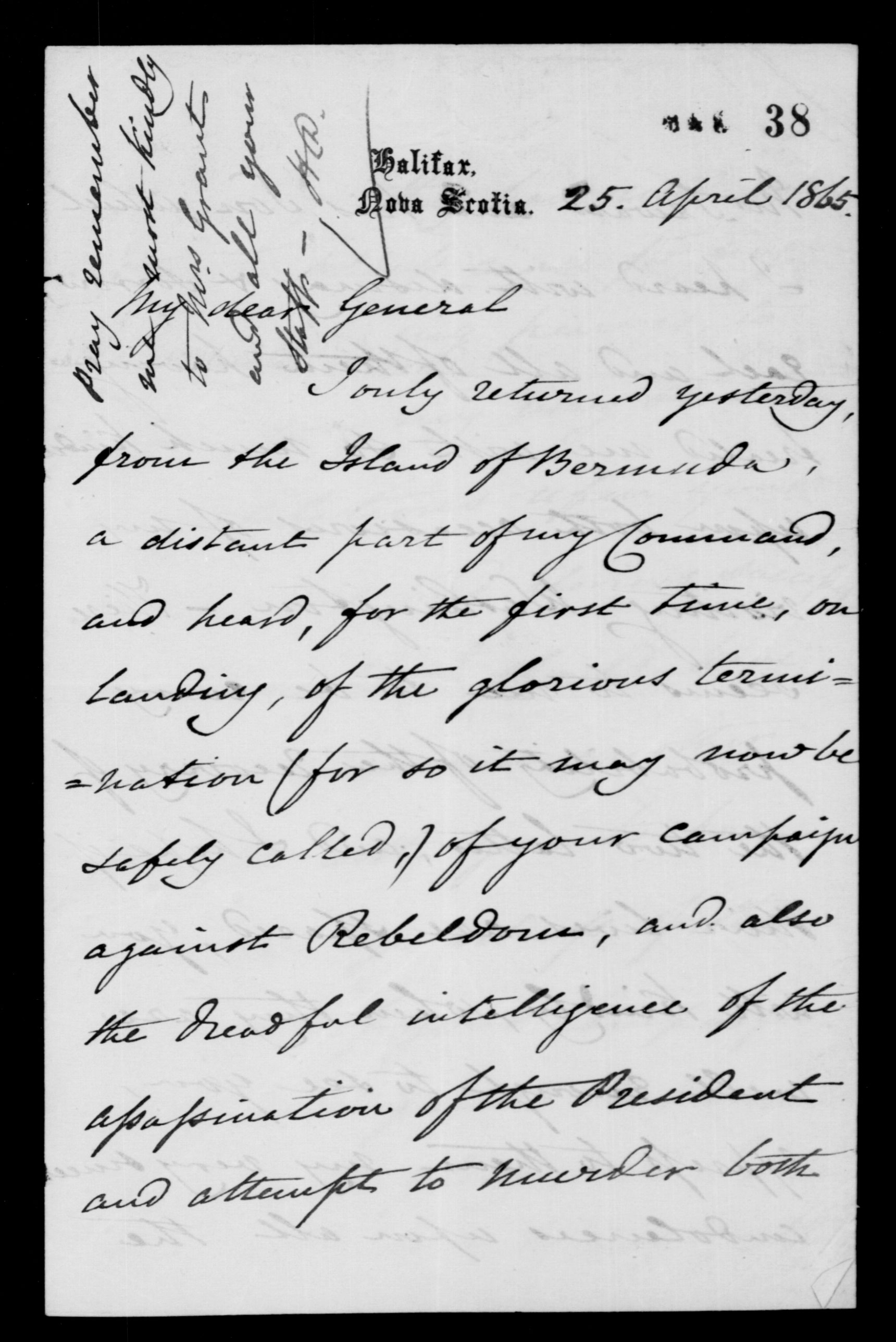
-
Description
In this letter from Sir Charles Hastings Doyle, a friend of Ulysses S. Grant and major-general in command of British troops in the Atlantic area, Doyle expresses his sorrow over the assassination of Lincoln. Doyle also goes on to thank Grant for his hospitality while visiting him in Center Point, Virginia and invites Grant and his wife to visit his home in Halifax, Nova Scotia.
-
Source
-
Rights
This item is in the public domain and may be reproduced and used for any purpose, including research, teaching, private study, publication, broadcast or commercial use, with proper citation and attribution.
-
Creator
Sir Charles Hastings Doyle
-
Date
April 25, 1865
from Jan. 9, 1866
A Speech on "Equality Before the Law"
-
Full Title
A Speech on "Equality Before the Law" Delivered by J. Mercer Langston In the Hall of Representatives in the Capitol of Missouri
-
Description
In this pamphlet put together by the Missouri State Executive Committee, a speech delivered by John Mercer Langston on January 9th, 1866 called for political emancipation for African Americans. Also within this pamphlet, an address by the Colored People of Missouri to the Friends of Equal Rights strived to make manhood, not color, the basis of suffrage and thanked God for using President Lincoln to emancipate African American slaves.
-
Source
-
Rights
This item is in the public domain and may be reproduced and used for any purpose, including research, teaching, private study, publication, broadcast or commercial use, with proper citation and attribution.
-
Tags
-
Cite this Item
Missouri State Executive Committee. "A Speech on "Equality Before the Law" Delivered by J. Mercer Langston In the Hall of Representatives in the Capitol of Missouri". Democrat Book and Job Printing House. Remembering Lincoln. Web. Accessed December 14, 2025. https://rememberinglincoln.fords.org/node/1129
-
Creator
Missouri State Executive Committee
-
Publisher
Democrat Book and Job Printing House
-
Date
January 9, 1866
from Jan. 9, 1866
A Speech on "Equality Before the Law" Delivered by J. Mercer Langston In the Hall of Representatives in the Capitol of Missouri
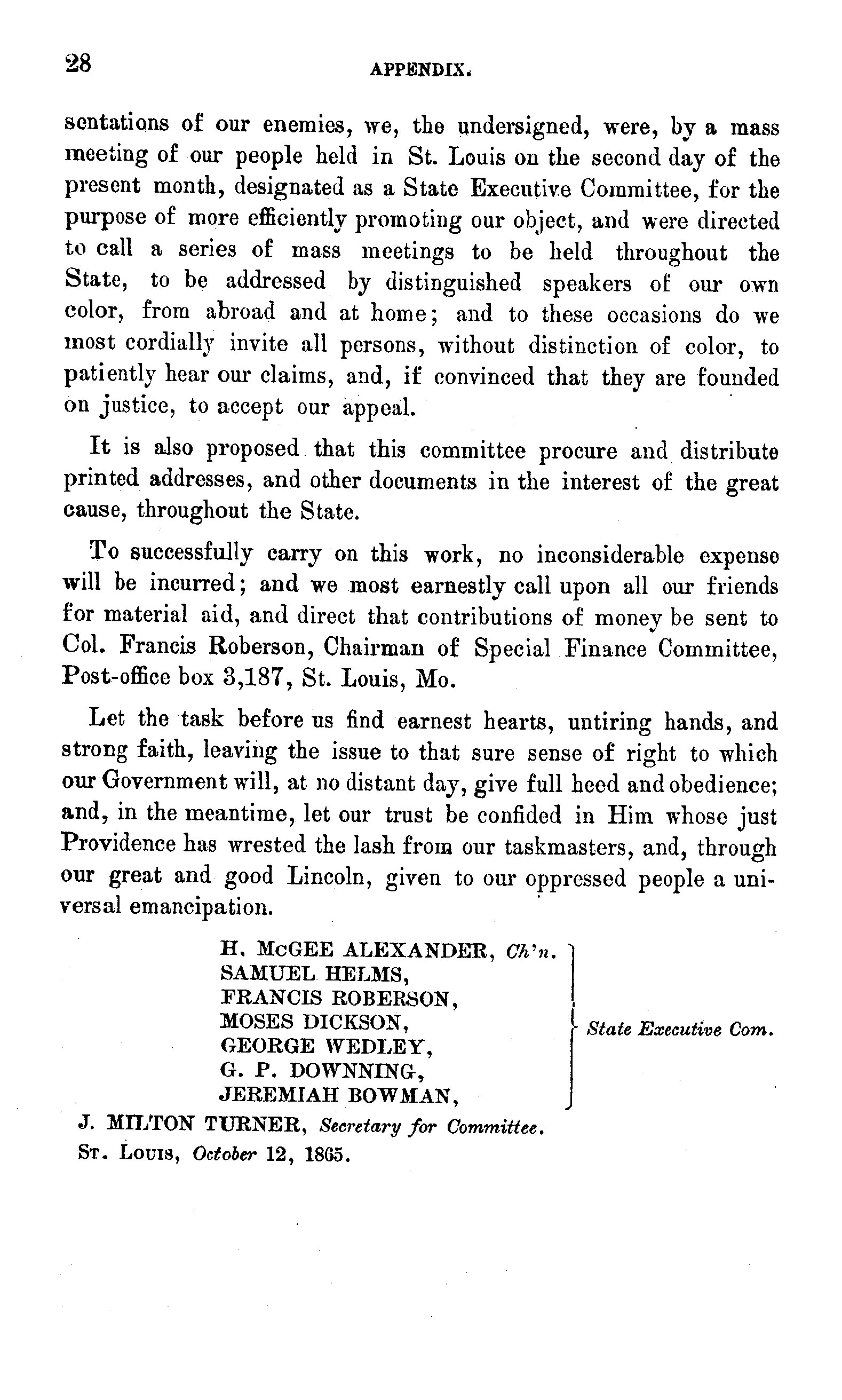
-
Description
In this pamphlet put together by the Missouri State Executive Committee, a speech delivered by John Mercer Langston on January 9th, 1866 called for political emancipation for African Americans. Also within this pamphlet, an address by the Colored People of Missouri to the Friends of Equal Rights strived to make manhood, not color, the basis of suffrage and thanked God for using President Lincoln to emancipate African American slaves.
-
Source
-
Rights
This item is in the public domain and may be reproduced and used for any purpose, including research, teaching, private study, publication, broadcast or commercial use, with proper citation and attribution.
-
Creator
Missouri State Executive Committee
-
Publisher
Democrat Book and Job Printing House
-
Date
January 9, 1866
from Jul. 4, 1865
Colored People's Educational Monument Association Celebration
-
Full Title
Celebration by the Colored People's Educational Monument Association in Memory of Abraham Lincoln
-
Description
On July 4, 1865--the first Independence Day after Lincoln's assassination--the Colored People's Educational Monument Association held a celebration in Washington, D.C., in commemoration of Lincoln, featuring speeches by prominent individuals such as Elder D.W. Anderson, the pastor of Washington's Nineteenth Street Baptist Church, William Howard Day, Senator Henry Wilson of Massachusetts, Senator Michael Hahn of Louisiana, and General Edgar Gregory. The speakers reflected on what the past year's events had meant.
-
Source
-
Rights
This item is in the public domain and may be reproduced and used for any purpose, including research, teaching, private study, publication, broadcast or commercial use, with proper citation and attribution.
-
Tags
-
Cite this Item
Colored People's Educational Monument Association. "Celebration by the Colored People's Educational Monument Association in Memory of Abraham Lincoln". McGill & Witherow. Remembering Lincoln. Web. Accessed December 14, 2025. https://rememberinglincoln.fords.org/node/1128
-
Creator
Colored People's Educational Monument Association
-
Publisher
McGill & Witherow
-
Date
July 4, 1865
from Jul. 4, 1865
Celebration by the Colored People's Educational Monument Association in Memory of Abraham Lincoln
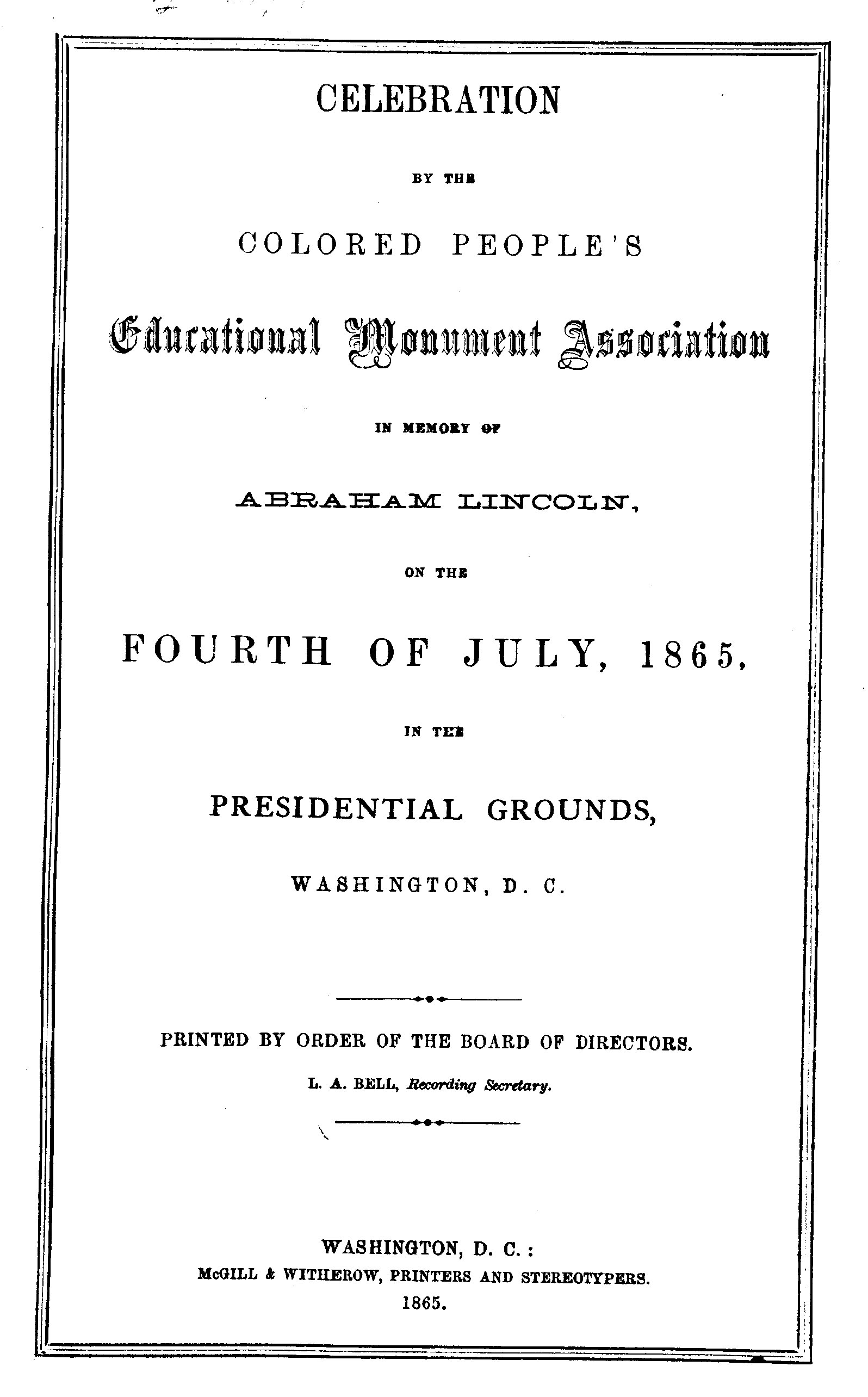
-
Description
On July 4, 1865--the first Independence Day after Lincoln's assassination--the Colored People's Educational Monument Association held a celebration in Washington, D.C., in commemoration of Lincoln, featuring speeches by prominent individuals such as Elder D.W. Anderson, the pastor of Washington's Nineteenth Street Baptist Church, William Howard Day, Senator Henry Wilson of Massachusetts, Senator Michael Hahn of Louisiana, and General Edgar Gregory. The speakers reflected on what the past year's events had meant.
-
Source
-
Rights
This item is in the public domain and may be reproduced and used for any purpose, including research, teaching, private study, publication, broadcast or commercial use, with proper citation and attribution.
-
Creator
Colored People's Educational Monument Association
-
Publisher
McGill & Witherow
-
Date
July 4, 1865
from Apr. 17, 1865
I.F. Quinby to Ulysses S. Grant
-
Full Title
I.F. Quinby to Ulysses S. Grant
-
Description
I.F. Quinby, a former U.S. general teaching at the University of Rochester in 1865, wrote to General Ulysses S. Grant, commander of the U.S. Army, expressing sadness over the assassination of Lincoln. He also shows relief for Grant, who was originally supposed to be the Lincolns' guest at Ford's Theatre the night of the assassination.
-
Transcription
[[?]]Lincolns Assassination Rochester NY
April 17th 1865
General U.S. Grant
My Dear Grant,
While the
whole people are plunged in the
deepest grief at the death of our
wise and most excellent President
there in many led with it a feeling of
thankfulness that you for whom the
same blow was intended, so pro-
[redentially]escaped
Your hopes of the recovery of
Secretary Seward are also realized
The nations soon arise itself
Gone it's almost stupor of grief
and foreboding of other calamities
to forcible in the trace of the will give
place to confidence we the ability
of those at the head of our affairs to
bring alert the peace and hate in all
prosperity whole reserved to well
aroused before the sad event
the people hope news less from you
in the pretense hence you have accomplished
for hence in the name of personal
friendship alone, but in the light of the
nation, where I ask you to take all
wise precautions to guard against
the assassins who may be watching
their oppertunity to strike at your
life.
with the most earnest wishes that
your life may be long passed
to your family and to the nation
I remorse
Sincerely your friend
Quinby
[Transcription by: Joseph Marsteller, Rachel Engl's class, Lehigh University.] -
Source
-
Rights
This item is in the public domain and may be reproduced and used for any purpose, including research, teaching, private study, publication, broadcast or commercial use, with proper citation and attribution.
-
Tags
-
Cite this Item
Isaac Ferdinand Quinby. "I.F. Quinby to Ulysses S. Grant". Remembering Lincoln. Web. Accessed December 14, 2025. https://rememberinglincoln.fords.org/node/1127
-
Creator
Isaac Ferdinand Quinby
-
Date
April 17, 1865
from Apr. 17, 1865
I.F. Quinby to Ulysses S. Grant
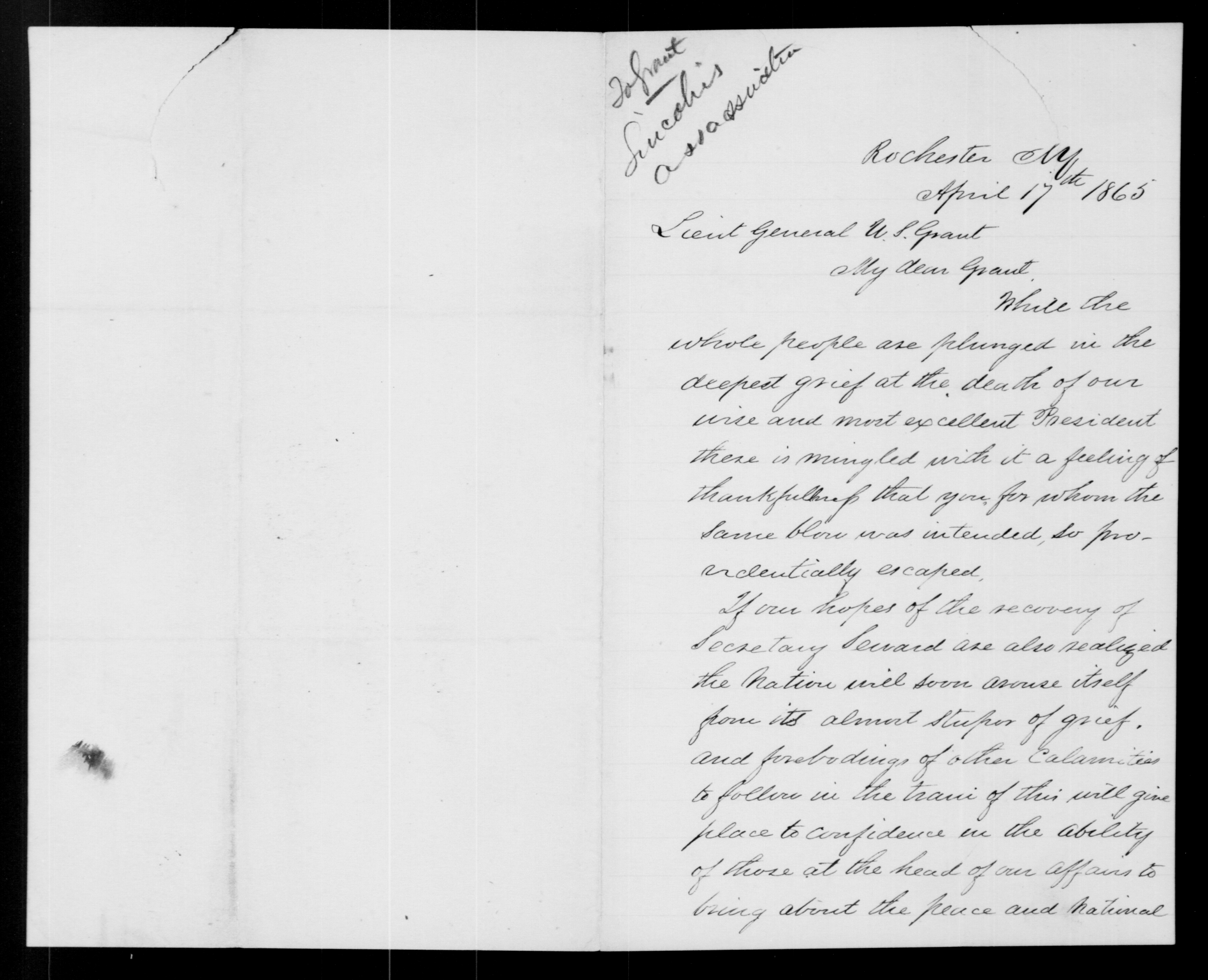
-
Description
I.F. Quinby, a former U.S. general teaching at the University of Rochester in 1865, wrote to General Ulysses S. Grant, commander of the U.S. Army, expressing sadness over the assassination of Lincoln. He also shows relief for Grant, who was originally supposed to be the Lincolns' guest at Ford's Theatre the night of the assassination.
-
Source
-
Rights
This item is in the public domain and may be reproduced and used for any purpose, including research, teaching, private study, publication, broadcast or commercial use, with proper citation and attribution.
-
Creator
Isaac Ferdinand Quinby
-
Date
April 17, 1865
from Apr. 18, 1865
President Abraham Lincoln's Washington, DC Funeral Directions and Notes
-
Full Title
President Abraham Lincoln's Washington, DC Funeral Directions and Notes
-
Description
This is a letter and invitation to Matias Romero, the minister of the Mexican Republic, to the funeral of President Abraham Lincoln at the White House. It includes the funeral procession, schedule and list of pallbearers.
-
Transcription
REPUBLIC OF MEXICO. 81
No. 3.
Mr. Hunter to Mr. Romero.
DEPARTMENT OF STATE,
Washington, April 18, 1865.
Sir: I have the honor to enclose a programme of arrangements for the obsequies of the late President. The religious services will take place at the Executive mansion at 12 o'clock to-morrow. Your attendance at half past eleven is invited.
I have the honor to be, with the highest consideration, your obedient servant,
W. HUNTER,
Acting Secretary.
Señor MATIAS ROMERO. &c., Washington, D. C.
_________
[Enclosure No. 1.]
Official arrangements at Washington for the funeral solemnities of the late Abraham Lincoln, President of the United States, who died at the seat of government on Saturday, the 15th day of April, 1865.
WAR DEPARTMENT,
Adjutant General’s Office, Washington, April 17, 1865.
THe following order of arrangements is directed:
ORDER OF THE PROCESSION.
Funeral escort—in column of march.
One regiment of cavalry.
Two batteries of artillery,
Battalion of marines.
Two regiments of infantry.
Commander of escort and staff.
Dismounted officers of marine corps, navy and army, in the order named.
Mounted officers of marine corps, navy army, in the order named.
All military officers to be in uniform, with side-arms.
CIVIC PROCESSION.
Marshal.
Clergy in attendance.
The Surgeon General of the United States army and physicians to to the deceased.
Pall-bearers. HEARSE. Pall-bearers.
Pall-bearers. Pall-bearers.
On the part of the Senate : On the part of the House :
Mr. Foster, of Conecticut, Mr. Dawes, of Massachusetts.
Mr. Morgan, of New York. Mr. Coffroth, of Pennsylvania.
Mr. Johnson, Maryland. Mr. Smith, of Kentucky.
Part ii----6
82 REPUBLIC OF MEXICO.
Mr. Yates of Illinois. Mr. Colfax, of Indiana.
Mr. Wade, of Ohio, Mr. Worthington, of Nevanda.
Mr. Conness, of California. Mr. Washburne, of Illinois.
Army: Navy:
Lieutenant General U. S. Grant Vice-Admiral D. G. Farragut.
Major General H. W. Halleck. Rear-Admiral W. B. Subrick.
Brevet Brigadier General W. A. Nichols. Colonel Jocab Zeilin, marine corps.
Civilians:
O. H. Browning. Thomas Corwin.
George Ashmun. Simon Cameron
Family.
Relatives.
The delegations of the States of Illinois and Kentucky, as mourners.
The President.
The cabinet ministers.
The diplomatic corps.
Ex-Presidents.
The Chief Justice and Associate Justices of the Supreme Court.
The Senate of the United States, preceded by their officers.
Members of the House of Representatives of the United States.
Governors of the several States and Territories.
Legislatures of the several States and Territories.
The federal judiciary and the judiciary of the several States and Territories.
The Assistant Secretaries of State, Treasury, War, Navy, Interior, and the
Assistant Postmaster General, and the Assistant Attorney General.
Officers of the Smithsonian Institution.
The members and officers of the Sanitary and Christian Commissions.
Corporate authorities of Washington, Georgetown, and other cities.
Delegations of the several States.
The reverend the clergy of the various denominations.
The clerks and employés of the several departments and bureaus, preceded by
The heads of such bureaus and their respective chief clerks.
Citizens and strangers.
The troops designated to form the escort will assemble in the avenue, north of the President’s House, and form line precisely at 11 o'clock a. m., on Wednesday, the 19th instant, with the left resting on Fifteenth street. The procession will move precisely at 2 o’clock p. m., on the conclusion of the religious services at the Executive Mansion, (appointed to commence at 12 o’clock, meridian,) when minute-guns will be fired by detachments of artillery stationed near St. John’s Church, the City Hall, and at the Capitol. At the same hour the bells of the several churches in Washington, Georgetown, and Alexandria will be tolled.
At sunrise on Wednesday, the 19th instant, a federal salute will be fired from the military stations in the vicinity of Washington, minute-guns between the house of 12 and 3 o’clock, and a national salute at the setting of the sun.
The usual badge of mourning will be worn on the left arm and on the hilt of the sword.
By order of the secretary of War:
W. A. NICHOLS,
Assistant Adjutant General
[Transcription by: Grace C., Dr. Susan Corbesero’s Class, Ellis School, Pittsburgh, Pennsylvania] -
Source
Google Books
-
Rights
This item is in the public domain and may be reproduced and used for any purpose, including research, teaching, private study, publication, broadcast or commercial use, with proper citation and attribution.
-
Tags
-
Cite this Item
William Hunter. "President Abraham Lincoln's Washington, DC Funeral Directions and Notes ". Government Printing Office. Remembering Lincoln. Web. Accessed December 14, 2025. https://rememberinglincoln.fords.org/node/1126
-
Creator
William Hunter
-
Publisher
Government Printing Office
-
Date
April 18, 1865
from Apr. 18, 1865
President Abraham Lincoln's Washington, DC Funeral Directions and Notes
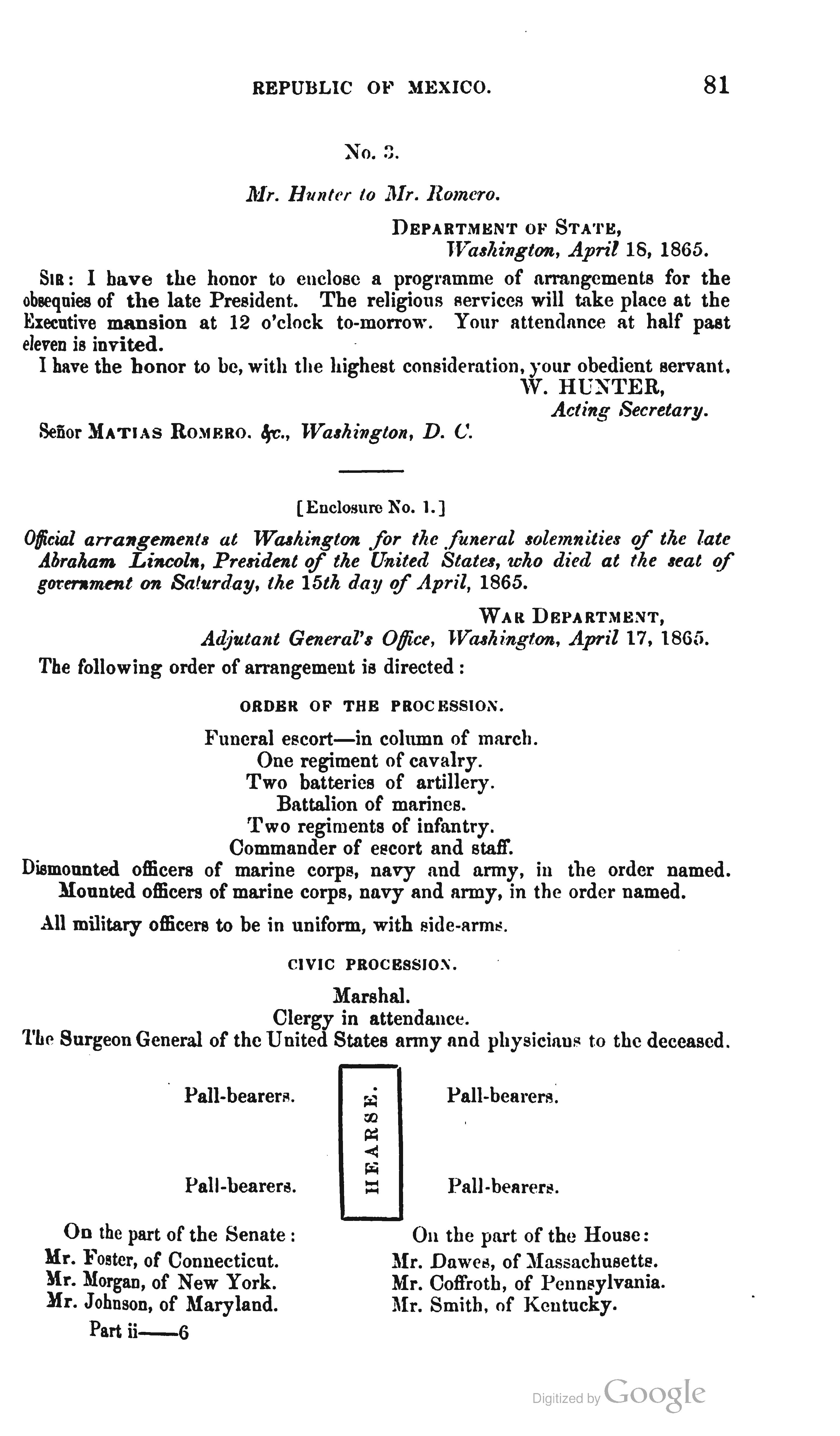
-
Description
This is a letter and invitation to Matias Romero, the minister of the Mexican Republic, to the funeral of President Abraham Lincoln at the White House. It includes the funeral procession, schedule and list of pallbearers.
-
Source
Google Books
-
Rights
This item is in the public domain and may be reproduced and used for any purpose, including research, teaching, private study, publication, broadcast or commercial use, with proper citation and attribution.
-
Creator
William Hunter
-
Publisher
Government Printing Office
-
Date
April 18, 1865
from Jul. 4, 1865
Condolences from the Governor of the State of Tabasco, Mexico
-
Full Title
Condolences from the Governor of the State of Tabasco, Mexico
-
Description
This is a condolence letter from the governor of the State of Tabasco in Southern Mexico. The letter expresses how sad the Mexican government is because of the death of President Lincoln, but they also congratulate the government on winning the American Civil War. The letter discusses the importance of July 4, America's Independence Day, and the country's dedication to freedom and liberty. During the 1860s, Mexico was also in the midst of war. Benito Juarez served as President in Mexico until 1863, when French forces invaded Mexico during the "French Intervention" which began in 1861. The French, backed by conservatives and nobility in Mexico, tried to overthrow Mexican President Benito Juarez. Allies of Juarez fled to New York City, considered a safe haven by Mexican liberals. Juarez set up his government in exile in northern Mexico, in Chihuahua City. This letter tries to solidify the relationship between the exiled government and the American government by reinforcing their shared beliefs and good will.
-
Source
Google Books
-
Rights
This item is in the public domain and may be reproduced and used for any purpose, including research, teaching, private study, publication, broadcast or commercial use, with proper citation and attribution.
-
Tags
-
Cite this Item
G. Mendez. "Condolences from the Governor of the State of Tabasco, Mexico ". Government Printing Office. Remembering Lincoln. Web. Accessed December 14, 2025. https://rememberinglincoln.fords.org/node/1125
-
Creator
G. Mendez
-
Publisher
Government Printing Office
-
Date
July 4, 1865
from Jul. 4, 1865
Condolences from the Governor of the State of Tabasco, Mexico
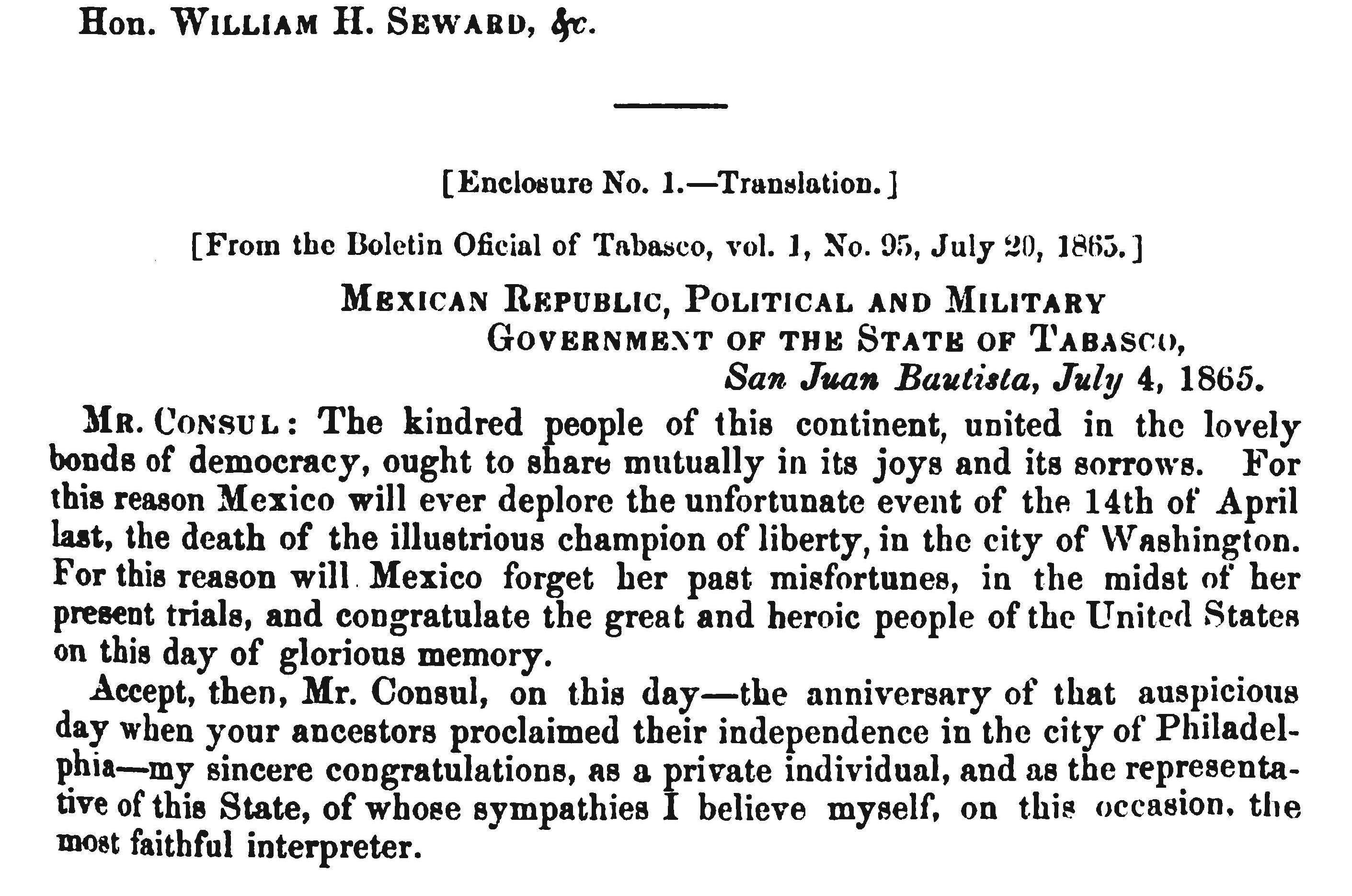
-
Description
This is a condolence letter from the governor of the State of Tabasco in Southern Mexico. The letter expresses how sad the Mexican government is because of the death of President Lincoln, but they also congratulate the government on winning the American Civil War. The letter discusses the importance of July 4, America's Independence Day, and the country's dedication to freedom and liberty. During the 1860s, Mexico was also in the midst of war. Benito Juarez served as President in Mexico until 1863, when French forces invaded Mexico during the "French Intervention" which began in 1861. The French, backed by conservatives and nobility in Mexico, tried to overthrow Mexican President Benito Juarez. Allies of Juarez fled to New York City, considered a safe haven by Mexican liberals. Juarez set up his government in exile in northern Mexico, in Chihuahua City. This letter tries to solidify the relationship between the exiled government and the American government by reinforcing their shared beliefs and good will.
-
Source
Google Books
-
Rights
This item is in the public domain and may be reproduced and used for any purpose, including research, teaching, private study, publication, broadcast or commercial use, with proper citation and attribution.
-
Creator
G. Mendez
-
Publisher
Government Printing Office
-
Date
July 4, 1865
from May. 16, 1865
Department of Foreign Relations and Government - Mexican Response to Lincoln Assassination
-
Full Title
Department of Foreign Relations and Government - Mexican Response to Lincoln Assassination
-
Description
In this official letter from the exiled Mexican government, Sebastián Lerdo de Tejada, the minister of foreign affairs, notifies the United States of their remorse for the death of President Abraham Lincoln. The letter says the Mexican government will fly flags at half mast and wear mourning attire for nine days to honor Abraham Lincoln. Lerdo de Tejada served as second in command to exiled Mexican President Benito Juarez during the "French Intervention" which began in 1861. The French, backed by conservatives and nobility in Mexico, tried to overthrow Mexican President Benito Juarez. Juarez set up his government in exile in northern Mexico, in Chihuahua City, and eventually won the war in 1867.
-
Transcription
Hon. William H. Seward, &c.
_____
[Enclosure No. 1. – Translation.]
[Official.]
DEPARTMENT OF FOREIGN RELATIONS AND GOVERNMENT—DEPARTMENT OF GOVERNMENT, FIRST BUREAU.
[Circular.]
The official confirmation has been received that the President of the United States of America, Abraham Lincoln, died at Washington, at seven o’clock and twenty-two minutes, on the morning of the 15th day of April last, in consequence of the wound inflicted upon him by an assassin at half past nine o’clock on the previous night. The deplorable end of President Lincoln is a cause of great regret to the government of the Mexican republic, and to all its good citizens, by reason of his eminent personal qualities and because, during his administration, the government of the United States has continued in the most friendly relations with that of the Mexican republic in the difficult state of affairs thereof.
With the view that the manifestations of the public sorrow for that end event may be adopted, the citizen President directs that the national flag be hoisted at half-mast upon all the public buildings and at all the military stations during the day subsequent to the reception of this circular, and that all the authorities, functionaries, and employés, both civil and military, clothe themselves in mourning during nine days.
Independence and liberty! Chihuahua, May 16, 1865.
LERDO DE TEJADA
The Citizen Governor of the State of ——— .
[Transcription by: Ricarda H., Dr. Susan Corbesero’s Class, Ellis School, Pittsburgh, Pennsylvania] -
Source
Google Books
-
Rights
This item is in the public domain and may be reproduced and used for any purpose, including research, teaching, private study, publication, broadcast or commercial use, with proper citation and attribution.
-
Tags
-
Cite this Item
Sebastián Lerdo de Tejada. "Department of Foreign Relations and Government - Mexican Response to Lincoln Assassination". Government Printing Office. Remembering Lincoln. Web. Accessed December 14, 2025. https://rememberinglincoln.fords.org/node/1124
-
Creator
Sebastián Lerdo de Tejada
-
Publisher
Government Printing Office
-
Date
May 16, 1865
from May. 16, 1865
Department of Foreign Relations and Government - Mexican Response to Lincoln Assassination
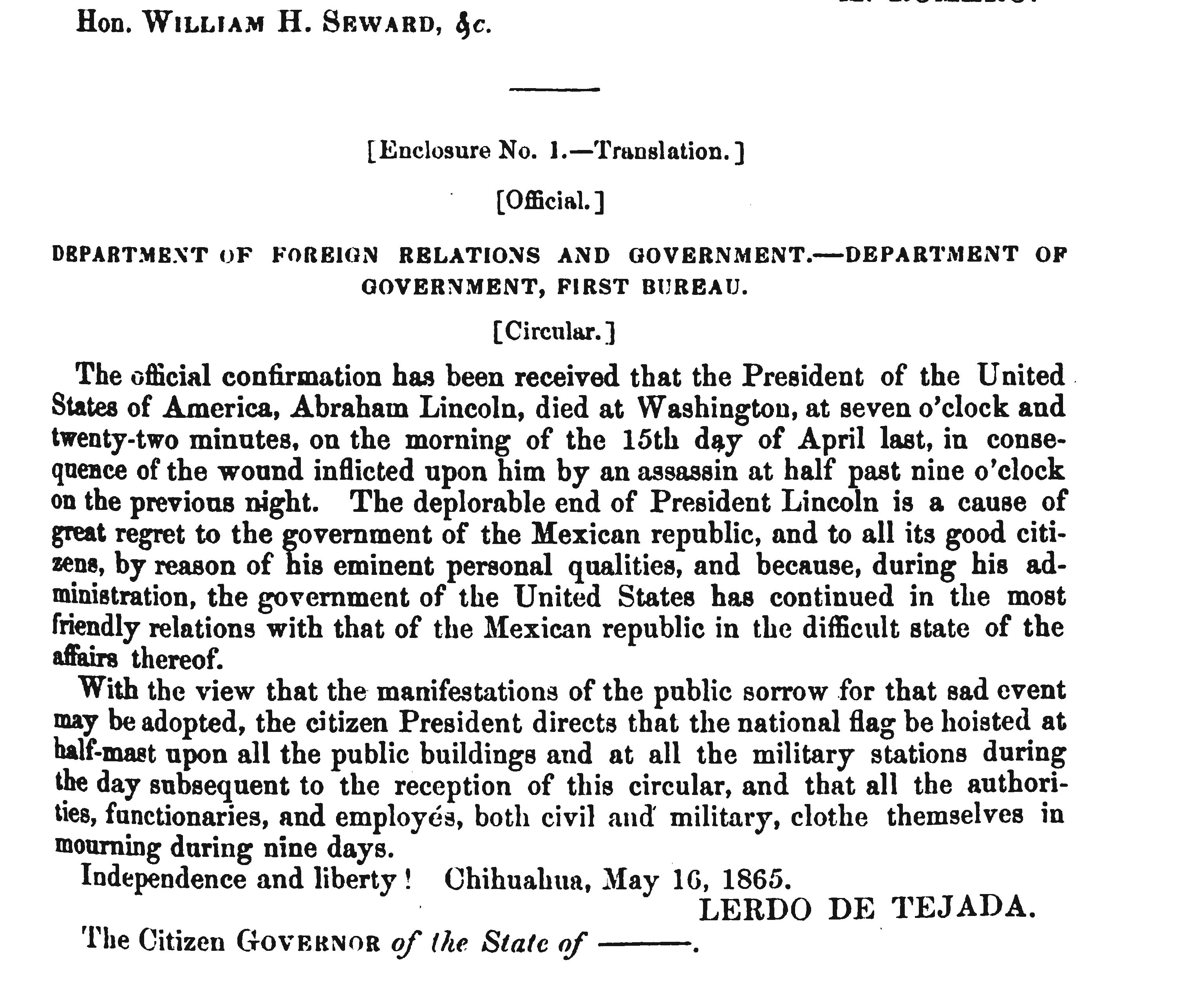
-
Description
In this official letter from the exiled Mexican government, Sebastián Lerdo de Tejada, the minister of foreign affairs, notifies the United States of their remorse for the death of President Abraham Lincoln. The letter says the Mexican government will fly flags at half mast and wear mourning attire for nine days to honor Abraham Lincoln. Lerdo de Tejada served as second in command to exiled Mexican President Benito Juarez during the "French Intervention" which began in 1861. The French, backed by conservatives and nobility in Mexico, tried to overthrow Mexican President Benito Juarez. Juarez set up his government in exile in northern Mexico, in Chihuahua City, and eventually won the war in 1867.
-
Source
Google Books
-
Rights
This item is in the public domain and may be reproduced and used for any purpose, including research, teaching, private study, publication, broadcast or commercial use, with proper citation and attribution.
-
Creator
Sebastián Lerdo de Tejada
-
Publisher
Government Printing Office
-
Date
May 16, 1865
from May. 11, 1865
Mexican President Benito Juarez Response to the Lincoln Assassination
-
Full Title
Mexican President Benito Juarez Response to the Lincoln Assassination
-
Description
This is a condolence letter from the exiled Mexican President Benito Juarez. In the letter Juarez mourns the loss of Abraham Lincoln and also hopes that the U.S. Secretary of State and his son recover from their wounds. On the night of President's assassination, U.S. Secretary of State William Seward was also attacked. He was stabbed repeatedly in his home by conspirator Lewis Powell. Eventually Seward recovered from his wounds. Benito Juarez served as President in Mexico until 1863, when French forces invaded Mexico during the "French Intervention" which began in 1861. The French, backed by conservatives and nobility in Mexico, tried to overthrow Mexican President Benito Juarez. Allies of Juarez fled to New York City, considered a safe haven by Mexican liberals. Juarez set up his government in exile in northern Mexico, in Chihuahua City.
-
Transcription
Hon. William H. Seward, &c.
_____
[Enclosure No. 1. – Translation.]
Chihuahua, May 11, 1865.
My Dear Friend …
We also received the day before yesterday the news of the total defeat of the confederate army on the 9th of April. The great pleasure this news afforded us was marred by the very sad impression which the shocking intelligence of President Lincoln’s assassination produced upon us. That great misfortune has profoundly impressed me, as Mr. Lincoln, who worked with so much earnestness and abnegation for the cause of nationality and freedom was worthy of a better fate than the poniard of a coward assassin. I do most earnestly hope that Mr. Seward’s wounds would not be mortal, and that his son too, may have been saved. I beg of you to pay a private visit to Mr. Seward in my name, expressing to him my grief for the misfortunes befallen upon him, and my best wishes for his speedy and complete recovery.
Benito Juarez
Senor Don Matias Rombro
[Transcription by: Ricarda H., Dr. Susan Corbesero’s Class, Ellis School, Pittsburgh, Pennsylvania]
-
Source
Google Books
-
Rights
This item is in the public domain and may be reproduced and used for any purpose, including research, teaching, private study, publication, broadcast or commercial use, with proper citation and attribution.
-
Tags
-
Cite this Item
Benito Juarez. "Mexican President Benito Juarez Response to the Lincoln Assassination". Government Printing Office. Remembering Lincoln. Web. Accessed December 14, 2025. https://rememberinglincoln.fords.org/node/1123
-
Creator
Benito Juarez
-
Publisher
Government Printing Office
-
Date
May 11, 1865
from May. 11, 1865
Mexican President Benito Juarez Response to the Lincoln Assassination
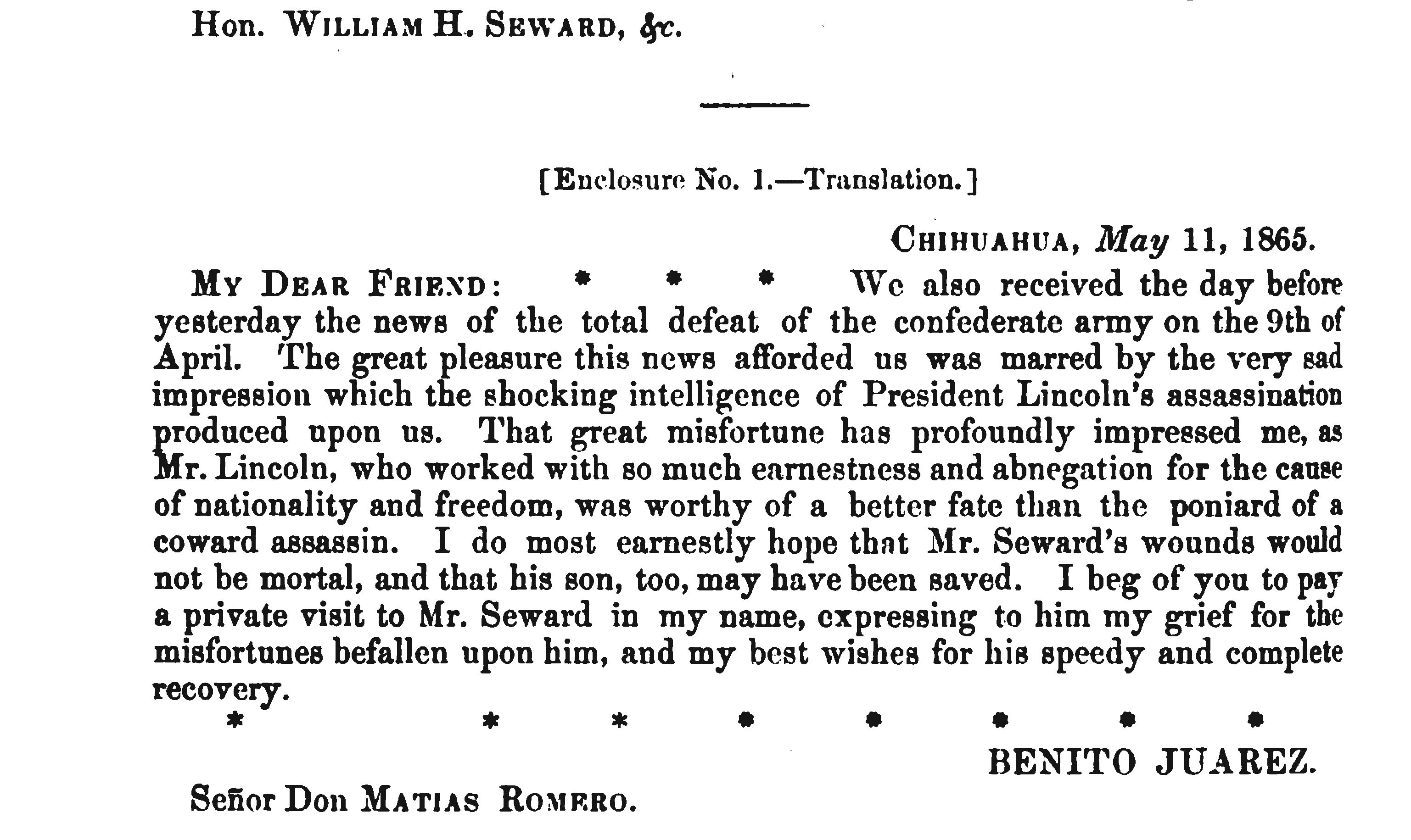
-
Description
This is a condolence letter from the exiled Mexican President Benito Juarez. In the letter Juarez mourns the loss of Abraham Lincoln and also hopes that the U.S. Secretary of State and his son recover from their wounds. On the night of President's assassination, U.S. Secretary of State William Seward was also attacked. He was stabbed repeatedly in his home by conspirator Lewis Powell. Eventually Seward recovered from his wounds. Benito Juarez served as President in Mexico until 1863, when French forces invaded Mexico during the "French Intervention" which began in 1861. The French, backed by conservatives and nobility in Mexico, tried to overthrow Mexican President Benito Juarez. Allies of Juarez fled to New York City, considered a safe haven by Mexican liberals. Juarez set up his government in exile in northern Mexico, in Chihuahua City.
-
Source
Google Books
-
Rights
This item is in the public domain and may be reproduced and used for any purpose, including research, teaching, private study, publication, broadcast or commercial use, with proper citation and attribution.
-
Creator
Benito Juarez
-
Publisher
Government Printing Office
-
Date
May 11, 1865